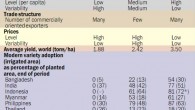The system of rice intensification (SRI) was developed in Madagascar 20 years ago by Fr. Henri de Laulanié of the Society of Jesus after 2 decades of working with farmers to raise their rice production without depending on external inputs. Today, SRI is gaining acceptance around the world. Practiced only in Madagascar until 1999, it has since demonstrated its environmentally...
Tag Archives: sustainable agriculture
Agricultural advances in the past 3 decades have made remarkable progress in providing affordable cereals to most of the poor in the developing world. As a result — and despite the continuing plight of 800 million desperately poor — we hear less these days about famine and severe calorie and protein deficiency in sub-Saharan Africa and South Asia, the two most vulnerable...















